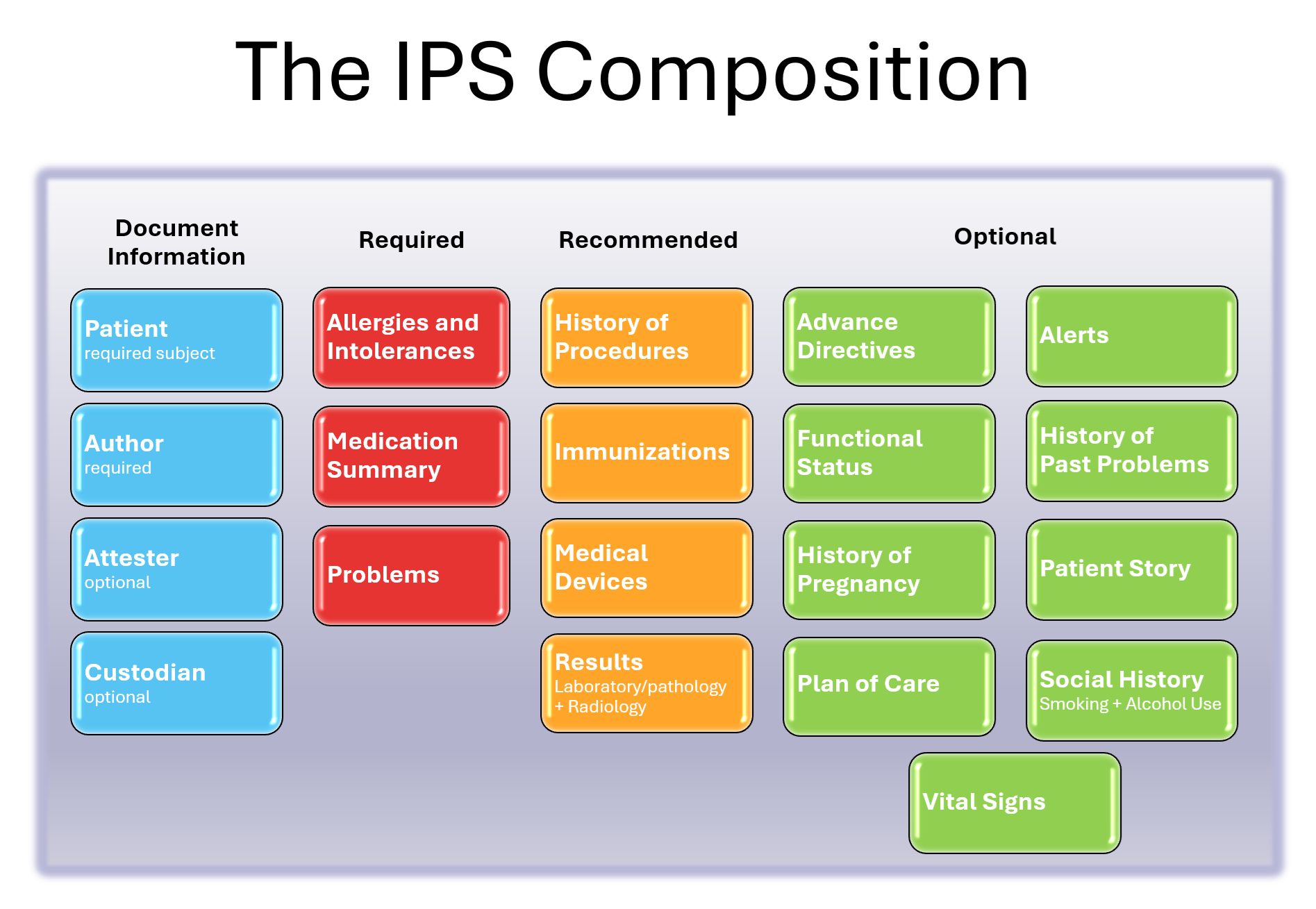International Patient Summary Implementation Guide, published by HL7 International / Patient Care. This guide is not an authorized publication; it is the continuous build for version 2.0.0 built by the FHIR (HL7® FHIR® Standard) CI Build. This version is based on the current content of https://github.com/costateixeira/fhir-ips/ and changes regularly. See the Directory of published versions
| Page standards status: Informative |
The IPS is composed by the following sections described below.
Figure 2: The IPS composition

The IPS problem section lists and describes clinical problems or conditions currently being monitored for the patient. If no information about problems is available or there are no known problems, this documented in the section through the use of emptyReason (at Composition.section) or a referenced resource (at Composition.section.entry).
This section documents the relevant allergies or intolerances for a patient, describing the kind of reaction (e.g. rash, anaphylaxis,..); preferably the agents that cause it; and optionally the criticality and the certainty of the allergy.
At a minimum, it should list currently active and any relevant historical allergies and adverse reactions. If no information about allergies is available, or if no allergies are known this should be documented in the section through the use of emptyReason (at Composition.section) or a referenced resource (at Composition.section.entry).
The medication summary section contains a description of the patient's medications relevant for the scope of the patient summary.
The actual content could depend on the jurisdiction, it could report:
In all those cases however medications are documented in the Patient Summary as medication statements or medication requests.
Populating this section must be one of the choices below:
The Immunizations Section defines a patient's current immunization status and pertinent immunization history.The primary use case for the Immunization Section is to enable communication of a patient's immunization status.The section includes current immunization status and the entire clinically pertinent immunization history that is known.
This section assembles relevant observation results collected on the patient or produced on in-vitro biologic specimens collected from the patient. These results may include laboratory, pathology, and radiology results.
This section includes entry choices to carry result observations (using Observation or referenced observations in DiagnosticReport) from:
The History of Procedures Section contains a description of the patient past procedures that are pertinent to the scope of the IPS.
Procedures may refer for example to:
The medical devices section contains narrative text and coded entries describing the patient history of medical device use.
The advance directives section contains a narrative description of patient's advance directives with links to supporting documents and consents.
This alerts section is used to convey information flagged to raise awareness of potential concerns and/or dangers to/from the subject of the IPS.
The functional status section contains a narrative description of capability of the patient to perform acts of daily living, including possible needs of the patient to be continuously assessed by third parties. The invalidity status may in fact influence decisions about how to administer treatments. Profiles to express disabilities and functional assessments may be specified by future versions of this guide.
The History of Past Problems section contains a description of the conditions the patient suffered in the past but are no longer tracked in the Problem List section of the IPS.
The pregnancy status and history is comprised of
The section contains narrative text along with optional resources that express what matters to a patient. This may include needs, strengths, values, concerns and preferences to others providing support and care. Information in this section may include:
Any resource type may be used to support narrative.
The plan of care section contains a narrative description of the expectations for care including proposals, goals, and order requests for monitoring, tracking, or improving the condition of the patient.
The social history is comprised of
The Vital signs section includes blood pressure, body temperature, heart rate, and respiratory rate. It may also include other clinical findings, such as height, weight, body mass index, head circumference, and pulse oximetry. In particular, notable vital signs or physical findings such as the most recent, maximum and/or minimum, baseline, or relevant trends may be included
The profiles that have been defined for this implementation guide are listed here.
Following are the profiles that have been defined for each section. (R) denotes a required section (i.e. must be present in an IPS), (S) denotes a recommended section, the others are optional: